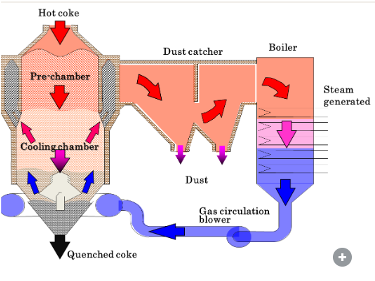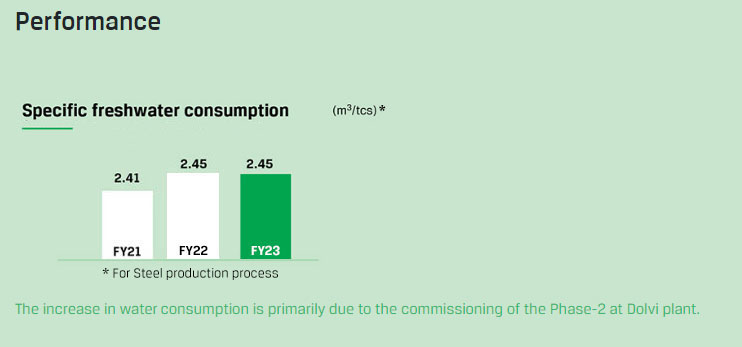Water Resource

Though 71% of Earth’s surface is covered with water, clean and safe freshwater suitable for drinking, cooking, bathing, and growing food is a scarce resource, especially in certain parts of the world. An absence of clean and safe freshwater, and associated problems with sanitation, also significantly increases the risk of illness and diseases, specifically for the young and old. As the population continues to grow and societies develop, the need for water is only going to increase, resulting in greater competition between the demands of industry, agriculture, and domestic households. Operations of JSW are also very much dependent on the availability of water which makes it a material topic for the company. JSW has identified risks associated with water scarcity and is continuously working towards water conservation and reduction of water consumption in its operations. There were no water-related incidents with substantial impacts on costs/revenues in the last four fiscal years.
SDG Mapping of JSW Steel’s Initiatives & Projects
SDG 12: Responsible Consumption and Production
As a large steelmaker, we depend on natural resources for running our operations. JSW Steel strives to reduce the usage of water not only in its operations but across the complete value chain by adopting water consumption reduction technologies along with water recycling activities.
Production of High Quality Demineralized Water from Sewage Water for Industrial Application at Cold Rolling Mill
- JSW Steel Vijayanagar has installed various state of the art water treatment facilities which has contributed in making it a benchmark in Specific Water Consumption.
- The sewage from Shankar Hill township (SHT) and Vijay Vittal (VV) Nagar township was treated in the sewage treatment plant (STP). Membrane Bio-Reactor (MBR) technology was chosen to further improve the STP water. This was used for production of demineralized (DM) water and utilized in the critical processes of the Cold rolling mill (CRM).
- Reduction in freshwater consumption of 3800m3/d.
- Reduced power consumption (1.84 Million kWh per year) as compared to the pumping of freshwater from source, leading to a reduction in CO2 emission: approx. 1508 tCO2e/year.
- No groundwater contamination and no deterioration of soil properties through proper handling of the sewage.
JSW has not only promoted the responsible usage of water inside its operations but has also done the same in the communities through its CSR activities.
- JSW Steel Salem Works made provision to provide drinking water throughout the year, besides arranging for water tankers during summers to alleviate perennial water problems faced by the local communities. Apart from this, a long-term water management plan was designed for a five-year horizon. Conserving rain water and creating safe drinking water sources are the pillars of this plan, along with strong partnerships with local NGOs, panchayats and National Bank for Agriculture & Rural Development (NABARD) for successful implementation.
- JSW Steel Vijayanagar in its commitment to offer sustainable prosperity to the farming community, has treated 17,400 hectares of land through watershed management around the facility.
- The public toilet constructed at Marine Drive, Mumbai by JSW Foundation was awarded the "Swachh City Award" by the Government of India - Ministry of Housing and Urban Affairs, in recognition for its innovation and best practices. This smart sustainable innovation in public utilities includes 90% less sewage, intelligent sewage disposal, solar powered, vacuum technology that saves 90% of freshwater, weathering steel and unique design.
Details of other such community uplifting initiatives by JSW Steel along with JSW Foundation can be found here.
SDG 9: Industry, Innovation and Infrastructure
- The Company aims to address the efficient use of water with the aid of new and innovative technologies.
- Vijayanagar plant has put up extensive instrumentation in water flow measurement to monitor water use on an hourly basis.
- CCTV cameras, additional flow-meters, pH meters, and conductivity meters were installed for effective monitoring of water discharge.
- Installation of CO2 injection system in Steel Melting Shop-1 (SMS) has improved thickener water quality in Vijayanagar further reducing freshwater consumption.
- Through the implementation of zero liquid discharge (ZLD) in all the manufacturing units of JSW Steel to reduce the freshwater intake, JSW contributes to SDG 6. All the wastewater generated in the unit is treated through reverse osmosis and reused as process water or in horticulture. More details on the efforts of wastewater reduction and ZLD can be found on Framework Waste Water
- JSW Steel has made the coke oven operations more water-friendly by replacing Wet Quenching by Coke Dry Quenching to cool hot coke.

Coke Dry Quenching
Coke Dry Quenching (CDQ) is a heat recovery system to quench red hot coke from a coke oven to a temperature appropriate for transportation. It is an energy-saving system in which, during the quenching process, the sensible heat of the red-hot coke is recovered and utilized for power generation or as steam. Unlike water quenching, which takes place in a span of a few seconds, CDQ is a gradual coke quenching system and improves coke strength and coke size distribution. CDQ results in cost reduction as even with lower quality coal good quality coke can be obtained. The CDQ coke has a lower moisture content (0.1 to 0.3%) which helps in reducing the Coke ratio of a Blast furnace. CDQ has an added benefit of a Steam generation of around 500-700 kg/t-coke and power generation of 140-185 kWh/t-coke. Due to all the above qualities, JSW is implementing CDQ in its upcoming projects as well and also slowly replacing existing wet quenching units in the existing plants.
SDG 6: Clean Water and Sanitation
- In pursuance of our stated commitments to source water carefully and use it inefficient and innovative ways, we have laid down a few objectives towards which we will strive.
- Vijayanagar plant is located in a water-scarce area and the unit has implemented numerous measures to secure adequate water for uninterrupted operations.
- A new Water Reservoir of 1.3 TMC storage capacity ensures an adequate supply of water for uninterrupted operations of the plant, mitigating an operational risk as Vijayanagar is a water-scarce region.
- Installation of a 500 m3/day Sewage Treatment Plant-Membrane Bio-Reactor (STP-MBR) and biodigester for treatment of sludge from STP and Canteen waste in Vijayanagar. The plant reuses 100% of industrial as well as domestic wastewater after proper treatment. More details of the STP and the initiatives taken to recycle/reuse waste effluent can be found at Waste Water Framework.
- JSW Mines have also done tremendous work in line with wastewater reuse and in-turn conserve water
- Implementing Scientific Water Conservation Plan
- Constructing structures that will filter silt and clay which otherwise would have flown to fertile fields rendering it infertile.
- Reducing the speed of water flow by constructing a series of check dams for reducing erosion and enhancing percolation.
- Water Storage structures on streams for better water augmentation and its use of ecological purposes.
- JSW Foundation, the CSR arm of JSW Group, also addresses the importance of responsible use of water and the adoption of water conservation activities by communities to ensure clean and safe drinking water availability for all. Some of the key works done by JSW Foundation are,
- Restoration of conventional water sources to revive natural water bodies to facilitate effective soil and water conservation.
- Partnered with the Government of Maharashtra in its ‘Jalyukt Shivar Abhiyan’ to build water conservation structures across villages in the Konkan region. Konkan, unlike many parts of Maharashtra, is not a drought-prone region; but being a coastal region, the water table is salty and being on the receding slope of Sahyadri ranges, the rainwater ends up in the sea. Thus, during summer, villagers of Jaigad and nearby villages complain of water scarcity not only for farming but for drinking purposes. JSW has tried to address this problem through its watershed management initiative. Under this project 21 small and medium-size dams have been constructed to arrest the rainwater and create a reservoir that could be used by villagers throughout the year.
For more details on the areas of focus and initiatives taken by the JSW foundation for the community visit here.

Water consumption trends of JSW Steel

| Water Consumption in Water Stressed Areas | UOM | FY 2019-20 | FY 2020-21 | FY 2021-22 | FY 2022-23 |
| Total Net Freshwater Consumption in Water Stressed Areas (total water withdrawals – total water discharges*) | million m3 | 49.92 | 49.42 | 54.93 | 52.50 |
* Since JSW Steel operates Zero Liquid Discharge facilities, there are no water discharges at any of our operational sites.
